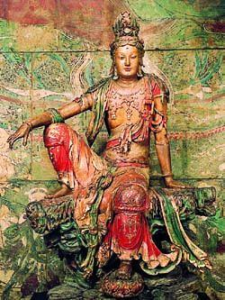Acupressure for Cancer Fatigue: Richard Harris
Kristen Sparrow • April 30, 2017


The SAR conference finished yesterday and there were some very provocative presentations. The work that I am most amazed at is the work of Richard Harris from University of Michigan. But there were other very impressive presentations also.
I’ve posted about Richard Harris’ work on Acupressure for cancer fatigue. He fleshed out and presented the final study yesterday and I continue to be completely blown away by it. Not only does acupressure actually cause specific brain activation depending on the points used, but the prescriptions definitively decrease fatigue and improve sleep. Absolutely mind blowing to me. (By the way, for acupuncturist readers, the points are “Relaxing acupressure points consisted of yin tang,anmian, heart 7, spleen 6, and liver 3. Four acupoints were performed bilaterally, with yin tang done centrally. Stimulating acupressure points consisted of du 20, conception vessel 6,large intestine 4, stomach 36, spleen 6, and kidney 3.”
He has made an app for patients to access, so a simple and effective way to help with fatigue that is safe and cheap and can be done at home. Incredible. Just incredible. I will try to get a copy of the paper to post here. Here you go.Harris Acupressure Cancer Fatigue JAMA_2016
Investigation of 2 Types of Self-administered Acupressure for Persistent Cancer-Related Fatigue in Breast Cancer Survivors: A Randomized Clinical Trial.
Abstract
Importance:
Fatigue is a common and debilitating late-term effect of breast cancer that is associated with poor sleep and decreased quality of life, yet therapies remain limited. Acupressure has reduced fatigue in previous small studies, but rigorous clinical trials are needed.
Objectives:
To investigate if 6 weeks of 2 types of self-administered acupressure improved fatigue, sleep, and quality of life vs usual care in breast cancer survivors and to determine if changes were sustained during a 4-week washout period.
Design, Setting, and Participants:
Phase 3 randomized, single-blind, clinical trial conducted from March 1, 2011, through October 31, 2014. Women were recruited from the Michigan Tumor Registry.
Interventions:
Randomization (1:1:1) to 6 weeks of daily self-administered relaxing acupressure, stimulating acupressure, or usual care.
Main Outcomes and Measures:
The primary outcome was change in the Brief Fatigue Inventory score from baseline to weeks 6 and 10. Secondary analyses were sleep (Pittsburgh Sleep Quality Index) and quality of life (Long-Term Quality of Life Instrument).
Results:
A total of 424 survivors of stages 0 to III breast cancer who had completed cancer treatments at least 12 months previously were screened, and 288 were randomized, with 270 receiving relaxing acupressure (n = 94), stimulating acupressure (n = 90), or usual care (n = 86). One woman withdrew owing to bruising at the acupoints. At week 6, the percentages of participants who achieved normal fatigue levels (Brief Fatigue Inventory score <4) were 66.2% (49 of 74) in relaxing acupressure, 60.9% (42 of 70) in stimulating acupressure, and 31.3% (26 of 84) in usual care. At week 10, a total of 56.3% (40 of 71) in relaxing acupressure, 60.9% (42 of 69) in stimulating acupressure, and 30.1% (25 of 83) in usual care continued to have normal fatigue. At neither time point were the 2 acupressure groups significantly different. Relaxing acupressure, but not stimulating acupressure, showed significant improvements in sleep quality compared with usual care at week 6, but not at week 10. Only relaxing acupressure significantly improved quality of life vs usual care at weeks 6 and 10.
Conclusions and Relevance:
Both acupressure arms significantly reduced persistent fatigue compared with usual care, but only relaxing acupressure had significant effects on sleep quality and quality of life. Relaxing acupressure offers a possible low-cost option for managing symptoms.

